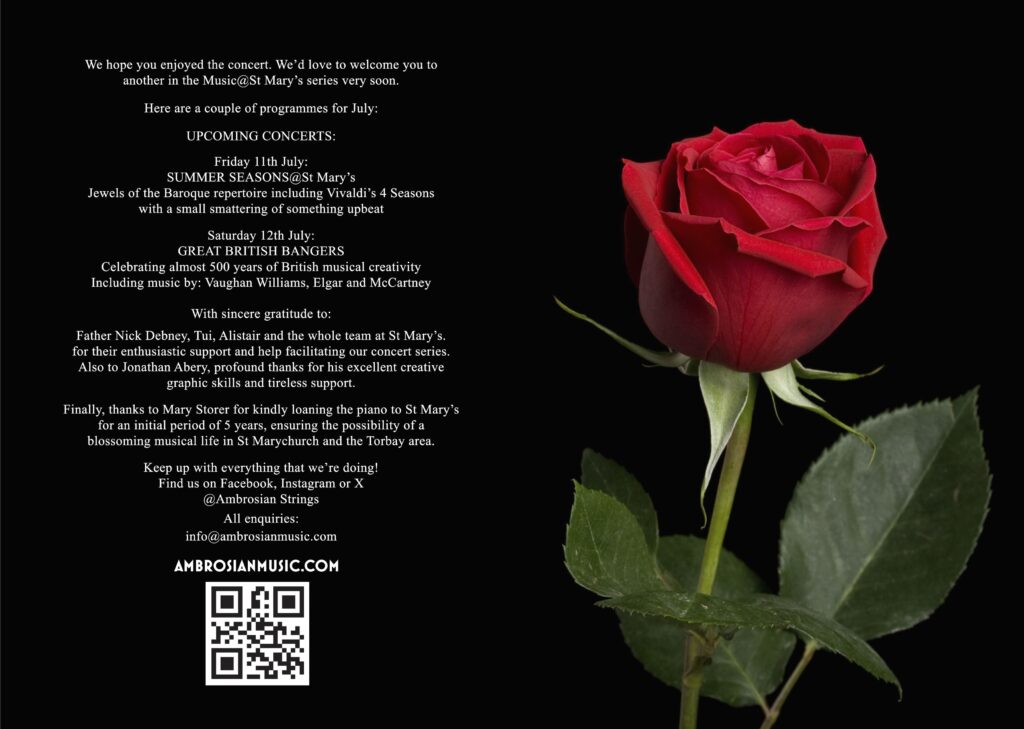
May 31st 7:30 pm Ambrosian Music Presents:
Ludwig van Beethoven
Piano trio in B flat Op.97 “Archduke”
1: Allegro moderato 2:Scherzo (Allegro)
3:Andante cantabile, ma però con moto 4: Allegro moderato
INTERVAL
(Refreshments available)
Antonin Dvořák
Piano trio No 3 in F minor Op. 65
1: Allegro ma non troppo
2: Allegretto grazioso – meno mosso 3:Poco adagio
4: Finale: Allegro con brio
Daniele Rinaldo Piano
Jonathan Storer Violin
Lucy Wilding ‘Cello
Ludwig van Beethoven’s Piano Trio in B-flat Major, Op. 97, the “Archduke” Trio (1811), dedicated to Archduke Rudolph, is a mighty chamber work. Premiered in 1814 with Beethoven at the piano, this 40-minute, four-movement piece — Allegro moderato, Scherzo: Allegro, Andante cantabile, and Allegro moderato — embodies his mature style. The opening Allegro radiates noble warmth, while the Scherzo sparkles with playful vitality. The Andante cantabile, a deeply lyrical set of vari- ations, forms the emotional core, leading to a vibrant, triumphant finale. Composed as Beethoven’s hearing declined, the trio balances intimate dialogue with symphonic grandeur, showcasing his genius for lyrical depth and structural innovation. Its rich interplay among piano, violin, and cello makes it a cornerstone of the repertoire, offering a profound exploration of resilience and beauty.
Antonín Dvořák’s Piano Trio No. 3 in F minor, Op. 65 (1883) is a profound and emotionally charged chamber work, composed during a period of personal tragedy following the death of his mother and three children.
Spanning four movements – Allegro ma non troppo, Allegretto grazioso, Poco Adagio, and Allegro con brio – this substantial piece departs from Dvořák’s characteristic Czech folk style, embracing a darker, more introspective tone influenced by Brahms and Smetana. The music conveys intense grief, yet retains folk elements, particularly in the Allegretto, blending Romantic depth with structural rigour. Premiered in 1883 with Dvořák at the piano, it remains a powerful testament to resilience and emotional honesty.
Daniele Rinaldo: Hailed as “a pianist of extraordinary dramatic flair” (The New York Times), “a memorable artist … of remarkable maturity and imagination” (El Pais), the Italian pianist Daniele Rinaldo has already performed as soloist in major venues and festivals all over the world, such as “Rising Stars” in Alice Tully Hall and Chelsea Music Festival in New York, Lorin Maazel’s Castleton Festival in the USA, Wigmore Hall, St-Martin-in-the-Fields and Barbican in London, Tonhalle in Zurich, Verbier Festival, Konzerthaus in Berlin and in the main halls of Paris, Basel, Tokyo, Geneva and Rome, as well as touring extensively Europe, Japan, China and South America.
Jonathan Storer, violin, has performed worldwide as director and soloist with the Heidelberg Chamber Orchestra. He was co-leader of the Augsburg Philharmonic, returning to England as principal violin with the Royal Northern Sinfonia. Jonathan has performed extensive amounts of chamber music during a 5-year posting as assistant professor of violin at the University of Trinidad and Tobago. Jonathan is a regular guest with the English Chamber Orchestra and London Concertante and founder of Ambrosian Strings.
Lucy Wilding was principal cellist in Northern Ballet Orchestra and Birmingham Opera Company before moving to London to join the Bridge String Quartet in 1994.The quartet has specialised in performing and recording 14 discs mainly of under represented British music. With the Bridge quartet, Lucy has performed at the most celebrated Chamber music venues in the UK, as well as performing international concert and educational tours throughout most of Europe, Kenya, and USA.